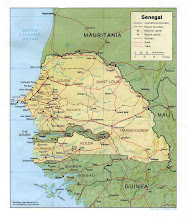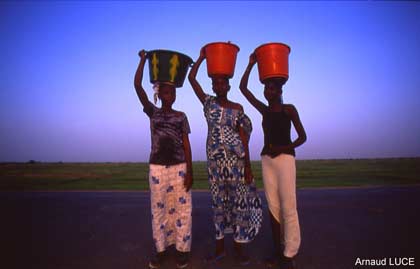From the pages of the OTAL shipping line we have this:
"An eight-fold increase in foreign direct investment in Senegal by 2010 through major infrastructure and mining projects could help lift economic growth over 7% a year, according to the IMF. With steel giant Arcelor Mittal planning a $2.2 billion iron ore mine investment and Dubai entrepreneurs pouring money into a new port and economic free zone, the IMF expected foreign investment to rise from 47 billion CFA francs [$106 million] in 2006 to at least 367 billion CFA in 2010.
Alex Segura, IMF representative in Senegal, said the multilateral agency forecast a medium-term growth rate for the poor West African country of 5.5 percent a year, but this could be sharply higher if proposed foreign investments went ahead.
Economic growth dipped to 2% in 2006 due in part to a long break in production at Senegal's struggling state-run phosphates producer ICS -- the country's largest exporter. In a strong endorsement of President Abdoulaye Wade's economic management, the IMF board officially agreed with Senegal a Policy Support Instrument [PSI] with the IMF at the start of this month. It was the first francophone country in Africa to reach such a deal. "
Sunday, March 23, 2008
Saturday, March 22, 2008
We recently came across an interesting summary of the development of Touba and its fascinating connection with global commerce while maintaining its unique character. The link is:
http://llnw.creamermedia.co.za/articles/attachments/01378_africancity.pdf
The article compares three West African cities which exploded over recent decades. Here's one of the insightful excerpts about Touba:
"More than half of all Touba households are described as primarily active in commerce and here imports and a consumer economy tied to the outer world, is especially significant. International remittances account for a huge share of income while the importation and dispersal of industrially produced goods from the whole world have taken over the Senegalese economy, so weak in “internationally competitive” productive activity. Touba makes sense as a town only if one starts to take stock of one major aspect of globalisation—the large-scale temporary or permanent movement of Africans, notably West Africans, to all corners of the globe, together with the decline in productive local activity."
http://llnw.creamermedia.co.za/articles/attachments/01378_africancity.pdf
The article compares three West African cities which exploded over recent decades. Here's one of the insightful excerpts about Touba:
"More than half of all Touba households are described as primarily active in commerce and here imports and a consumer economy tied to the outer world, is especially significant. International remittances account for a huge share of income while the importation and dispersal of industrially produced goods from the whole world have taken over the Senegalese economy, so weak in “internationally competitive” productive activity. Touba makes sense as a town only if one starts to take stock of one major aspect of globalisation—the large-scale temporary or permanent movement of Africans, notably West Africans, to all corners of the globe, together with the decline in productive local activity."
Labels:
Africa,
globalization,
Mourides,
Touba,
trade
Subscribe to:
Posts (Atom)


